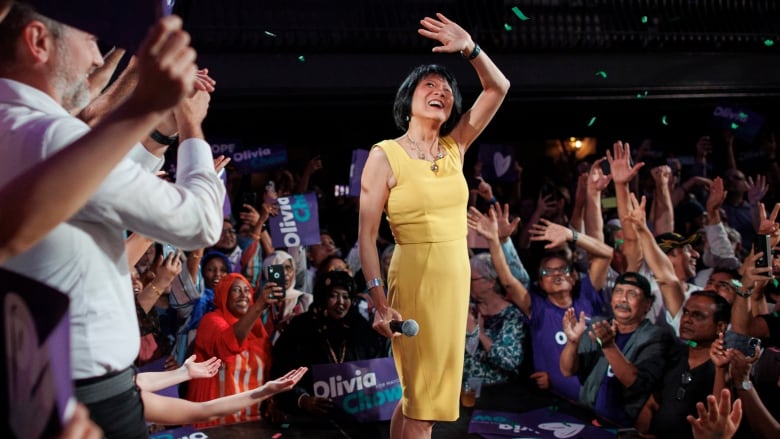Olivia Chow rides message of hope — and Toronto’s desire for change — to mayoral byelection win
Olivia Chow walked through throngs of supporters before hopping on stage to give her victory speech on Tuesday night.
The mayor-elect seemed barely able to contain her joy — and relief.
“Wow, what a night,” Chow said, laughing and holding her hand to her chest, as the crowd at her election party at The Great Hall on Queen St. West launched into celebrations that would go on well into the night.
“If you ever doubted what’s possible together,” she said. “If you ever questioned your faith in a better future. And what we can do with each other, for each other, tonight is your answer.”
In the end, Chow, 66, defeated 101 rivals to win. Former councillor Ana Bailão surged to second place, eventually losing by 30,000 votes — a total that doesn’t reflect the drama as the polling results gave Bailão an early lead that looked briefly like it could hold.
But those who were hoping for a Chow win were rewarded, which was fitting for a candidate who made “hope” a central plank of her campaign.
Former city councillor Joe Mihevc said that message is true to who Chow is. The theme of hope represented a marked departure from 2014 when Chow ran for mayor and finished a distant third to John Tory.
By her own admission, Chow, a former Toronto councillor and New Democrat MP, was nervous and afraid to make an error in that election. This time, she entered a crowded field and appeared calm and confident while her rivals launched repeated attacks on debate stages, in speeches and in election advertising.
“She ran like there was no tomorrow,” Mihevc said.
“She’s run full of confidence. She knows her politics. And I think that actually proved itself to be very attractive. It’s Olivia at her strongest self.”
Andrew Tumilty, a senior consultant with communications firm Enterprise Canada, credited Chow’s team for navigating the challenging waters of this campaign. Tumilty, who served as war room manager for former mayor John Tory, said in order to maintain and grow her lead in the early polls, Chow had to give her supporters enough “bold policy” to get them on board while also not taking too many risks.
“I think they deserve a lot of credit for that,” he said.
Here’s a look at how the vote broke down across the city’s 25 wards:
Call it name recognition, or celebrity, or just plain being known by Torontonians, Chow came in as the frontrunner and never relinquished that status.
Even in the hectic final days of the campaign, which saw Tory endorse Bailão and Ontario Premier Doug Ford throw his might behind Mark Saunders, Chow stuck to her plan.
“I think Olivia Chow’s team has run a very disciplined frontrunner’s campaign,” Tumilty said.
It’s official: Toronto had a ‘change election’
Chow will become the third woman to serve as Toronto’s mayor and the first racialized person to serve as mayor in the city’s modern history. She’s also the first progressive mayor since David Miller.
Toronto Metropolitan University politics professor Myer Siemiatycki said after over eight years of having Tory in the city’s top job, voters were ready for a change.
Chow, he said “captured the mood of Torontonians, that they’re ready for a different, more proactive, and better resourced city hall.”
So what will she do next?
Chow has made some promises that signal a significant policy shift from Tory. Here are just three:
- She has pledged to reverse TTC cuts put in place by Tory’s administration while also freezing fares to help increase ridership.
- She has promised to create a public builder to help get shovels in the ground on more affordable housing.
- She has also said she would tear down the eastern leg of the Gardiner Expressway and create a boulevard between it and the Don Valley Parkway.
All of those plans will be expensive, and they come at a time when the city is facing a budget shortfall of at least $1 billion.
Siemiatycki said by voting for Chow, many Torontonians have signalled they want those changes. They’ve also signed on (like it or not) to her plan to increase taxes above the rate of inflation — something Tory, and Tory-linked candidates like Bailão — have for years vowed not to do.

But Chow has said she would introduce a “modest” property tax increase, and Siemiatycki said many voters seem to have trusted her on that.
“There’s a recognition that there’s a high price to be paid for not increasing municipal revenue,” he said. “The lack of affordable housing, problems with transit, the perceived deterioration of municipal services. That all traces back to a lack of revenue on the part of the city.”
Chow has also promised to not use the “strong mayor” powers granted by Ford’s government that would let her craft her own budget rather than have city staff deliver it. If she keeps her word, that means any tax hike will need council support.
Winning that support begins in earnest on Tuesday.









Redes Sociais - Comentários